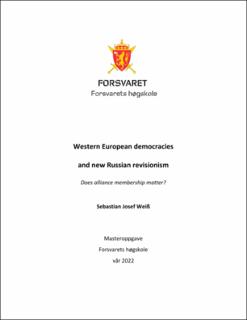| dc.description.abstract | A steadily more aggressive course of action by Russia changed both the security situation in Europe and the security and defense policy of European states. Furthermore, in the second decade of the 21stcentury, NATO has shifted back its focus, away from stabilisation missions to collective defense. But not every member nation has kept pace with the adjustments. Particularly the obligation to invest at least 2% of the GDP into defense measures, which is also referred to as the NATO Defense Investment Pledge, has been a subject of disagreement among NATO members. This thesis takes the dissent as a starting point to highlight the reasons for the way and the intensity in which states react to a specific threat. It tries to determine if the reaction of a country to a new threat is predominantly influenced by the state’s alliance membership or simply the country’s geopolitical location. The countries Germany, Norway and Sweden, which differ in size and location and include NATO members as well as a non allied state, were chosen as comparison units.
For all three states, both the defense expenditure and the procedure and intensity of changing the orientation of the armed forces within the period from the end of the Cold War until 2020 were analyzed. In order to achieve the objective of the thesis, the following research question shall be discussed and answered: Is membership in an alliance such as NATO the crucial factor that has determined western European states’ defense policy response to Russia’s new aggressive revisionism, or does geopolitical exposure to Russia offer a more convincing explanation?
This thesis examines the aspects “defense expenditure” and “(re-)orientation of the armed forces” and reveals in both cases that geopolitics override the commitments that arise from the membership in an alliance. Regarding the first case, i.e. defense expenditure, it is notable that Sweden’s changes in defense investments keep up with those of the other states considered in this research. This applies to the time of rearmament in the 90’s as well as to the increase in investments after 2014 or, in the case of Sweden, especially after 2017. The second case, (re-)orientation of the armed forces, is even more distinct. It shows that Sweden reversed several measures taken in the age of stabilization missions at a good pace to regain mobilization abilities and high-intensity warfighting capabilities. Sweden’s effort was the decisive factor that led to the conclusion that geopolitics matter most. | en_US |
